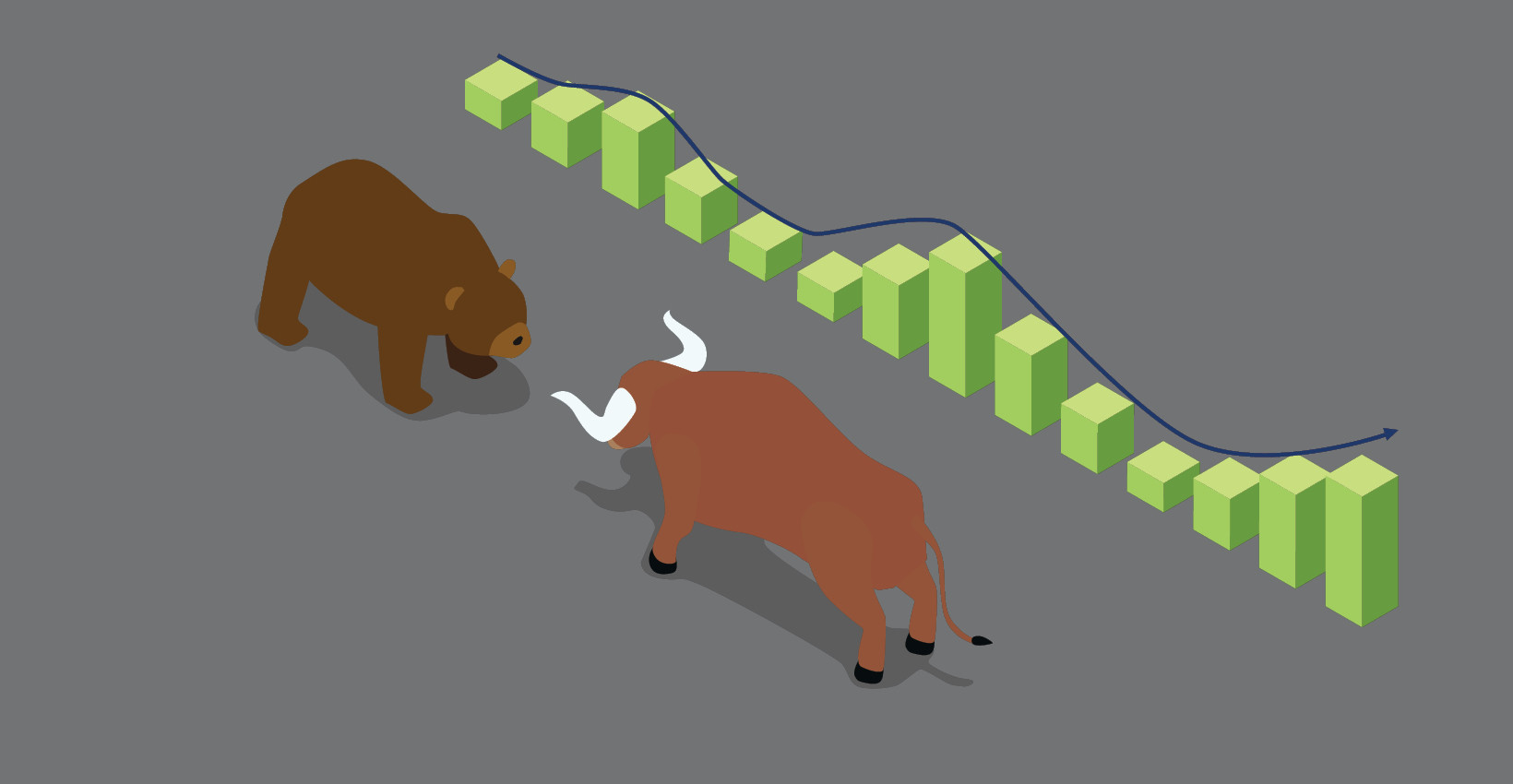Bulls vs. bears: A look at market extremes

When we say “bulls vs. bears,” what comes to mind? No, it’s not Chicago-based pro sports teams; rather, we’re talking about the animal descriptors commonly used in reference to the overall state of the financial markets. Bull markets are prolonged periods of time where asset prices are expected to rise. On the other hand, bear markets are periods of time where stock prices are expected to fall, with a pullback of 20% or more from their most recent highs as a general barometer. In short, bull markets are good; bear markets, not so much.
Bulls, bears, and you
If you consume news and follow current events, it’s likely you’ve heard words and phrases like bear market, recession, inflation, rising interest rates, etc. These topics are certainly related, but they’re in no way mutually exclusive. For instance, although bear markets and recessions often go hand in hand, they describe different issues. “Bulls” and “bears” can be directly linked to investor sentiment, or how investors feel about the future of financial markets. If sentiment is good, investors are more inclined to buy. If sentiment is negative, the opposite would be true. A recession is a measurable slowdown in economic output and is generally defined as two or more consecutive quarters that exhibit a decline in gross domestic product, or GDP; the National Bureau of Economic Research (NBER) is the agency in charge of setting the official start and end dates of recessions.
Technically, stocks are currently in a bear market; however, we are not yet in a recession. A recession may occur in the near term, or it may not; it heavily depends on how well the Fed’s actions handle interest rates and control unemployment — which is a topic for another day. For now, know that while these phrases are often used interchangeably and are certainly related, they are not the same. Always remember that the economy is not the stock market — the market could be up, while economic output is simultaneously down, and vice versa.
None of us are in identical places with respect to our financial journeys, but whether you have assets invested in the market or not, economic health and financial markets affect all of us. Have you filled your gas tank lately? Do you have debt with variable interest rates? Are you trying to buy your first home? How much was your last grocery bill compared to previous months? When it comes down to it, money is a tool that allows us to accomplish goals, and all of these economic factors work together to either increase or decrease pressure on our financial lives — pressure we all feel, regardless of market involvement.
How to prepare for the bear
So, what can we do to prepare for a possible near-term recession? First, don't panic. Next, here are a few immediate actions we can all take to relieve some of the financial pressure and build your financial house on solid rock:
Eliminate and avoid high-interest debt. Unfortunately, debt is all too common. And while some debt is to be expected (like school loans, mortgages, etc.), it’s best to avoid high-interest debt, especially when preparing for an economic downturn. Interest can easily get out of control and become very difficult to eliminate.
Create and maintain an emergency fund. A survey from marketplace.org found that only 44% of Americans would be able to cover a $1,000 emergency expense today — so make sure you have an emergency fund! Unexpected events will eventually happen, and when they do, an emergency fund could be what keeps you from assuming high-interest debt to cover the unexpected expense. How much should you have in your emergency fund? A good rule of thumb is to have 3 to 6 months of household expenses saved up. Three months may be appropriate if you live in a dual-income household; six months may be more appropriate if you are the sole breadwinner.
Create (and follow) an accurate and realistic household budget. Want to reduce stress? Create and follow a household budget! Following a budget has many benefits; for example, it creates purpose and intentionality. If we can’t separate poor spending habits from good ones, how will we ever save enough for that first home purchase, retirement, and many other important future goals? If you’re spending money you don’t have, you’re likely incurring higher-interest debt as previously discussed. A great exercise is separating your expenditures into two categories: discretionary expenses (wants) and non-discretionary expenses (needs). Examples of non-discretionary expenses are housing, taxes, debt, groceries, utility bills, etc.; examples of discretionary expenses are entertainment, the newest smartphone, eating out, Netflix, etc. (Yes, we said it, Netflix is discretionary!) If you’re spending more than you earn, take an honest look at the budget, and begin eliminating discretionary spending items until your expenses are less than your earnings.
Insights for investors
For individuals who currently invest, we reiterate our first tip: Don’t panic. Financial markets are cyclical, and things are rarely as bad (or as good) as you think. Behavioral finance tells us that when we allow emotion to command our decisions, the results are usually not favorable. It can be difficult, even painful, to watch account balances decrease in value. Many times, we convince ourselves that we’re making logical investment decisions when they are, in fact, purely emotional. During the Great Recession (2007-2009), many investors simply could not stand to see their investments lose more value. They sold their positions at the worst possible times or moved to safer instruments. Following every bear market is a bull market. Many investors who emotionally exited their investments did not re-enter the market, or they re-entered at a less advantageous time. As a result, many did not fully participate in the longest bull market in U.S. history.
Does that mean one should sit idly by and pay no attention to their investments during a bear market or a possible recession? Absolutely not! Instead, we should focus on things we can control. We can control our asset allocations (i.e., how much we have invested in stocks vs. bonds) and how our money is invested, given our time horizons and investment objectives. We can control our budgets, our spending habits, and our savings rates. If we get these correct, history tells us that things have a way of working out. Avoid being reactionary with investments. Be patient, be calm, have a plan, and stick to it.
Have investment questions? Our friendly investment experts are here to help. Visit us online or give us a call.
Learning Center articles, guides, blogs, podcasts, and videos are for informational purposes only and are not an advertisement for a product or service. The accuracy and completeness is not guaranteed and does not constitute legal or tax advice. Please consult with your own tax, legal, and financial advisors.
|




